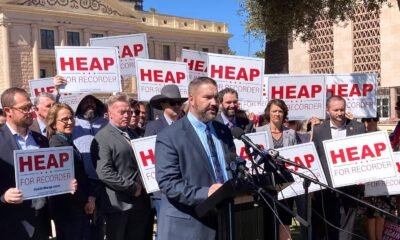Aaron Gunches
Ex-Prosecutors Unite with Mayes in Controversial Death Penalty Showdown

In a pivotal legal clash, Arizona Attorney General Kris Mayes has garnered support from notable figures in her dispute with Maricopa County Attorney Rachel Mitchell regarding the execution of Aaron Gunches. Recently, former Attorney General Terry Goddard, along with ex-county attorneys Rick Romley and Barbara LaWall, submitted a request to the Supreme Court, urging the rejection of Mitchell’s endeavor to obtain a warrant for Gunches’ execution.
The group contends that the management of death penalty cases falls squarely under the purview of the Attorney General’s Office, citing the history and specific legislation surrounding the issue. Attorney Andrew Stone, representing the former officials, emphasized the potential pitfalls of allowing Mitchell’s actions, declaring them as “bad public policy and unworkable.”
The legal battle centers on Gunches, who admitted guilt to first-degree murder and kidnapping in the 2002 incident involving Ted Price, his girlfriend’s ex-husband. A previous execution warrant was issued in 2022 but expired without execution due to delays.
Mayes, elected in 2023, has chosen to pause pursuing a new warrant while awaiting a report from the special Death Penalty Commission appointed by Governor Katie Hobbs. Mayes stated, “Recent executions have been embroiled in controversy,” underscoring issues related to flawed execution protocols.
Governor Hobbs has echoed these sentiments, expressing the need for assurance that the practices surrounding executions are safe and effective. She noted the troubling instances of botched procedures in recent executions.
The much-anticipated report won’t be available until year-end, but it has already influenced the legal landscape. Mitchell asserts she possesses the authority to file for an execution date on behalf of “the state,” prompting the critique from Goddard, Romley, and LaWall, who argue that allowing this could set a dangerous precedent.
Their brief highlights Arizona statutes that designate the Attorney General as the “chief legal officer,” tasked with handling state-level proceedings, a role they argue should not be undermined by county attorneys who operate within limited jurisdictions.
The trio warns that if every county prosecutor claims to represent “the state,” it could lead to significant court congestion as judges would have to resolve inter-office disputes before tackling core legal matters. Stone articulated that this misinterpretation could provoke confusion, burdening an already strained judicial system.
Furthermore, they stressed that acquiring an execution warrant involves complex legal maneuvers beyond merely submitting a document to the Supreme Court, necessitating specialized knowledge and resources typically managed by the Attorney General’s office.
Mitchell, responding to the legal filing, criticized it as an extension of Mayes’ “unsupported conclusions” regarding her authority. She dismissed the claim that ongoing reviews of death penalty practices are pertinent to Gunches’ case, asserting that the necessary conditions for issuing a warrant were fulfilled.
She highlighted the rights of victims, specifically Karen Price and her daughter, who have called for prompt legal action in Gunches’ case, emphasizing that her office is bound by law to align with victims’ requests.
Debate continues among county attorneys regarding the jurisdiction over death penalty cases. Coconino County Attorney William Ring expressed reservations about concurrent authority, while Pima County Attorney Laura Conover raised concerns about the overarching implications of such power dynamics, asserting the need for statewide consistency in capital cases.
Mayes has not ruled out future execution warrants but is keen to address disparities in death penalty applications across Arizona. Citing statistics, she noted a significant concentration of death row inmates from Maricopa County, indicating potential inequalities in how capital punishment is enforced statewide.


















